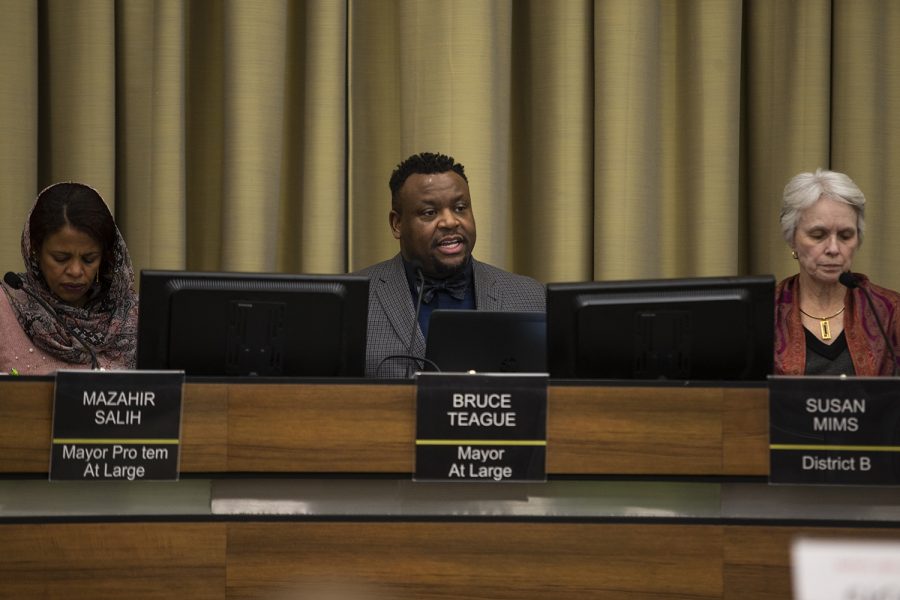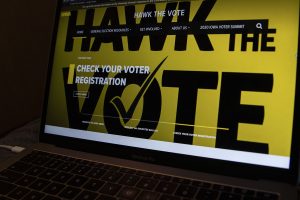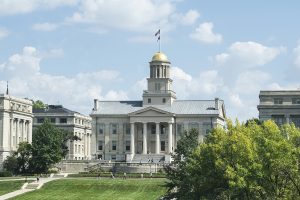City Council closer to creating commission addressing racial injustice in Iowa City
Iowa City City Council will review a revised resolution on the creation of a Truth and Reconciliation Commission at their formal meeting tomorrow night.
Nichole Harris/The Daily Iowan
Iowa City Mayor Bruce Teague addresses the crowd at an Iowa City City Council meeting on Tuesday, Feb. 18, 2020.
September 14, 2020
The Iowa City City Council may reach an agreement to create a Truth and Reconciliation Commission to address past and future systemic racial inequalities in Iowa City at Tuesday night’s meeting.
Creating the Truth and Reconciliation Commission was something the council committed to in a 17-point resolution in June in response to Black Lives Matter protests, led by the Iowa Freedom Riders, across Iowa City. Creating the commission was one of several demands for the council made by the Iowa Freedom Riders.
This will be the fourth time the resolution has come before the council. Councilors have sought public input on the structure and mission of the Truth and Reconciliation Commission during past meetings.
The commission would be tasked with finding evidence and testimony of past and current racial injustices in Iowa City, providing forums for creative expression, and facilitating discussions and opportunities for learning about discrimination.
City Councilor Laura Bergus, who has worked on drafting new versions of the commission alongside City Councilor Janice Weiner, said she and Weiner had received new input from the Iowa Freedom Riders since the council’s last meeting and drafted a revised resolution for this week’s meeting.
Bergus and Weiner presented the new draft to Iowa City City Attorney Eleanor Dilkes, who included a memo in this week’s city council agenda on which proposals from the Iowa Freedom Riders had and had not been added into the resolution.
Of those proposals, four were outlined in the memo as being problematic: an undefined set of mandates/objectives of the commission and a budget independent of the city council, overall independence from city council, the ability for the commission to “take strong affirmative action” to protect those that participate in the commission’s process, and power for the commission to identify perpetrators and have access to documents and witnesses.
RELATED: City Council defers Truth and Reconciliation Commission for a third time after community input
Bergus said she felt good about the work she and Weiner have put into the drafts.
“So all of that is to say, if you look at the memo from the city attorney and the revised draft document itself, we tried to pull all that together,” Bergus said. “And I think we’ve succeeded. I mean, I have yet to talk with my colleagues about it and we’ll be having that discussion at our formal meeting tomorrow.”
She said she hopes that the resolution will pass Tuesday night, but that it’s hard to tell what will happen until the meeting.
“It’s certainly been a really interesting and exciting process for me, but I can’t wait for the commission to get underway,” Bergus said. “I think it’s going to be really transformative for our community.”
Weiner also said she felt good about the new draft and hopes that city council will pass the revised resolution Tuesday.
“I am hopeful, I believe we are hopeful, that it will be considered and passed at this session because I really think it’s important that we get this moving,” Weiner said. “The reason that we deferred it to this meeting was to make sure that we could gather all the comments that came in at the last meeting. So I think we feel good that we’ve put together a good product.”
Mayor Pro Tem Mazahir Salih said that she doesn’t want to pass the resolution unless the community feels satisfied by its implementation.
“To me, this is one of the things that should be permanent in the city of Iowa City, that’s why I want it to be well done,” Salih said. “And I will try my best because we need to have it happen as soon as possible, but we don’t have to rush for something not satisfying the people.”
Iowa Freedom Riders organizer Raneem Hamad, who proposed several amendments to the resolution on behalf of the Iowa Freedom Riders at the Sept. 1 city council meeting, said she wished councilors had been more communicative of the legal limitations of the commission in discussions with the group.
Hamad said she would have preferred more specific language on how the commission would be able to protect people who participate in its work.
“I really wanted some language in resolution about legal protections for victims and survivors who come and speak out during the process,” she said. “And that was something for example, there really wasn’t any actual strong language, in my opinion, for that.”
Still, Hamad said the Iowa Freedom Riders, which is one of a few organizations the council wants to be represented on the commission, will continue to work with the council and support the commission.
“We’re just going to accept the limitations that are there and just try to work, do the best that we can with the commission as it continues to be developed,” she said.
Caleb McCullough contributed to this report.






